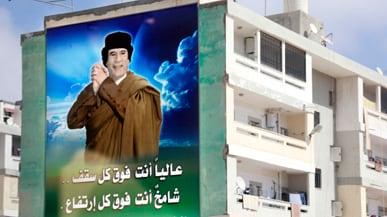As protests—and the government's brutal retaliation—spread to Libya's capital for the first time, Col. Gaddafi's son took to state TV to warn against the uprising. Read the latest here.
Protests in Libya intensified again Sunday, spreading toward the nation’s capital for the first time. Hoping to tamp down the uprising, a son of leader Muammar Gaddafi spoke on national television and warned of a civil war if demonstrations against his father continue. “Libya is not Tunisia or Egypt,” Sayf Gaddafi said, adding that the regime would fight “ until the last bullet.” Witnesses reported heavy gunfire in Tripoli following the speech Sunday night, as well as tear gas and live bullets from security forces. The U.S. State Department said it is “ gravely concerned” about the situation.
The regime has kept a tight lid on the protests, shutting off the nation’s Internet and blocking media communications.

Military forces attacked a second funeral procession on unarmed protesters on Sunday in the country’s second-largest city, Bengzhai, with the total number dead now up to 209. More protesters drove a tank and car with explosives into a military camp that signifies a base of power for Gaddafi. One witness described the horror: "The situation is very, very grim at the moment.... What we have here can only be described as genocide." “Dozens were killed... We are in the midst of a massacre here," said another protester. In addition to the violent crackdown, Libyan authorities have attempted to block communications, cutting off access to Facebook and Al-Jazeera and barring foreign journalists from approaching the scene.
Protesters' Demands
Like many other countries run by authoritarian, autocratic governments in the Middle East and Africa, Libya's people are seeking an overthrow of their leader and his entrenched government. Muammar Gaddafi is currently the longest serving head of state in the world, having held power in Libya since a coup in 1969. Unrest throughout the region has given the movement a new urgency, but many Libyans have wanted an end to Gaddafi's regime for years, recalling many corrupt incidents throughout the leader's history. In just one example, 1,200 prisoners were allegedly killed in the Abu Slim prison massacre on June 29, 1996, after they had objected to their inhumane conditions inside the prison.
A Region in Flux
Libya is in northern Africa, its northernmost region bordered by the Mediterranean Sea. Egypt, recently the site of a historic revolution, borders a majority of its eastern region, and Sudan (with its own historic independence referendum taking place last month) borders the its southeast tip. Libya's west is bordered by Algeria and Tunisia, the country where the ouster of longtime president Zine El Abidine Ben Ali set off the region's new activism. Its population of 6.4 million people is relatively small in proportion to the country's area, which makes it the fourth-largest country in Africa. As of 2009, Libya also has the fourth-highest GDP per capita in Africa, most likely due to its vast petroleum reserves and low population.
Gaddafi Clings to Power
Gaddafi has shown no sign of backing down. Instead, he has responded with an increase of army forces to disperse demonstrations and has interfered with Libya's Internet connections, through which the protests first gained ground. Gaddafi also mirrored a move of toppled Egyptian leader Hosni Mubarak when he sent out mass text-messages warning against those " who dare to violate the four red lines,"—meaning Gaddafi himself, national security, oil, and Libyan territory.
When he first came to power, Gaddafi espoused Arab nationalism and referred to the system backing his new regime as "Islamic Socialism." But he runs a dictatorship today, and in recent years, rumors have swirled that he has created a decadent, wealthy family dynasty; a recent batch of WikiLeaks cables from the U.S. Embassy in Libya has fueled suspicion of the family's excessive expenditures and corruption. One such leak detailed a lavish 2010 New Year's Eve party sponsored by Gaddafi's son in St. Barts; another revealed domestic-abuse charges against another of Gaddafi's sons, who was accused of beating his wife in a London hotel. A separate report found another of Gaddafi's sons had smuggled arms into Germany.
Libya's Thorny Ties to the U.S.
The United States and its allies have attempted to enter Libya's good graces in recent years, not only to secure access to the country's oil resources, but also as part of an overall effort to build more peaceful ties with the region. In 2008, the U.S. sent the first American ambassador to Tripoli since diplomatic relations with Washington were cut off in the 1970s. Prior to this olive branch, the U.S. meddled in Gaddafi's plans to obtain a nuclear weapon and convinced the country to accept responsibility for the 1998 bombing of Pan Am Flight 103. While the achievements suggested a effort on Gaddafi's part to bring his nation out of diplomatic isolation, the ruler has since faced accusations of human-rights violations, and Libya's current political unrest poses a major diplomatic and national security challenge to the Obama administration.
International Condemnation
Obama has condemned the Libyan regime's clampdown on peaceful protesters, as he has in response to clashes in Bahrain, Yemen, and Egypt. "Wherever they are, people have certain universal rights, including the right to peaceful assembly," Obama said in response to the region's unrest. In addition, the U.N. High Commissioner for Human Rights reprimanded Libya's response to protests, saying they were "illegal and excessively heavy-handed."






